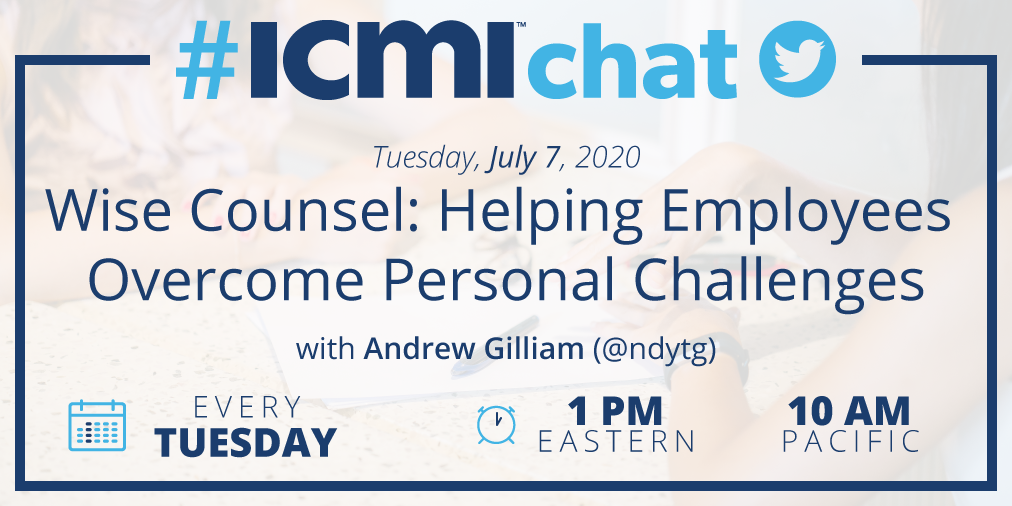By
The Editors
|
Date Published: July 01, 2020 - Last Updated September 08, 2020
|
Comments

At one time or another, we've all been mistreated by companies who stand firmly by policies that weren't appropriate for the circumstances. Many customer service professionals have experienced internal conflict between doing the right thing and following the rules. Although our organization's policies and procedures are generally fair and necessary, it's impossible to account for every possible scenario in advance. This is where employee empowerment comes in.
Join us on Tuesdays at 1 p.m. Eastern, 10 a.m. Pacific to weigh in on the contact center industry's most pressing challenges. Next week, we explore "Wise Counsel: Helping Employees Overcome Personal Challenges." A question preview follows this article.
In an ideal world, employees are equipped with the knowledge, resources, and authority to treat customers well. Policies would serve as guidelines adapted to each situation according to the organization's core values and brand promise. In reality, employee empowerment is easier said than done. Empowerment presents challenges for both leaders and employees, and it requires immense trust in your colleagues. This week, we got #ICMIchat's take on employee empowerment and their strategies for success.
Defining Empowerment
It's impossible to empower employees without a clear understanding of the term. We often think of empowerment as the delegation of authority, but that's only one facet of a complex topic. To be truly empowered, employees need the knowledge, resources, and authority to make decisions independently. Wise decision making requires understanding the consequences and likely outcomes of each alternative, so it's necessary for empowered employees to be trained in both policies and procedures and how the business works. Likewise, knowledge and authority are little use without the resources to execute decisions.
Employee "empowerment" occurs when employers trust employees to make good decisions & exempt them from blame when a well-intentioned decision has an undesired outcome.
Freedom to act, within appropriate parameters, to solve problems, come up with creative solutions, take corrective actions, etc. - on behalf of customers or co-workers. A certain level of autonomy, with the encouragement to use it.
It's not technology - that's enablement, and we sometimes get the two confused. Empowerment comes from culture - 'do the right thing' (sorry, first cliche) for both the customer and the organisation.
Empowerment Improves Experiences
In customer service, employee empowerment isn't about setting new strategic directions for the company or making huge investments. Most often, we're concerned with doing right by our customers, evoking the emotions we want our brand to represent, and compensating for blind spots and unforeseeable circumstances in our policies and procedures. Additionally, empowerment demonstrates a high level of trust in our employees' competence and commitment, strengthening the employer-employee relationship.
Customers, now more than ever, expect tailored solutions on first contact, without additional hand-offs or escalations. Additionally, employees who enjoy autonomy have shown to be more engaged in their work, resulting in better outcomes for their customers.
It’s important to everything a company does. It’s relevant in every situation where an employee has to make a decision that ultimately impacts the customer.
Contact center agents have the power to influence what people think about a product or company. They are quite literally the voice of the company. Empowering agents and training them well increases their job satisfaction and allows them to give superior service.
Empowered employees are engaged employees. Reduced turnover. Critical & creative thinking increase and solutions meet the needs of the CT. Ability to solve problems creates interesting work and inspired agents.
Delegation Difficulties
Business leaders care deeply about the success of their company, and they take steps, like standardizing procedures and enacting policies, to ensure the organization operates as intended. Although well-intended, the concentration of all authority at the management level limits the company's ability to react to rapid change. It's hard to give up control over things that are important to us, but letting go is a necessity along the path to success.
A bank once "empowered" their agents to waive fees at their discretion. Simple and great, right? The outcome was an inconsistent CX. Some waived everything, some waived nothing, many were in the middle. Guard rails were not clearly defined and parameters set.
It may be hard for managers because they don't get support. EX and thus Employee Engagement get placed on HR's shoulders. Plus, without employee journey mapping to guide and align across organization, actions and results become inconsistent. Like CX, there needs to be a champion to help.
Empowering employees is difficult because it requires a robust NH training, continuing education, and a consistent & effective coaching strategy. Leaders understand. Managers choose to micro-manage & negatively impact CX.
Managing Risks
Empowering employees to work autonomously isn't without risks. We've all accidentally made poor choices when decisions were demanded in real-time. Leaders can manage the risks of empowering employees by providing them with adequate information, coaching and reviewing the outcomes of past decisions, and clearly defining the boundaries of their authority.
This manager needs to look deep inside of themselves and begin a mental shift. Am I in leadership to bring out the best in people, or am I in leadership because I don't want someone else leading me? Not everyone should aspire to leadership roles.
Managers leery of empowering employees can begin by introducing a pilot program. Carefully training and empowering a small number of trusted employees and monitoring results is a lot less scary!
The term Empowerment can be a little mushy. Identify opportunities for empowered employees to apply decision-making skills to customer facing processes, and consciously coach/develop/share decision-making skills + guideline interpretation.
With openness and honesty, describe accurately where those guard rails are, and operate within them themselves.
Testing The Limits
One of the hardest parts of being an empowered employee is knowing when its acceptable to act unilaterally; not all scenarios will perfectly match the policy manual. It's up to leadership to continuously provide constructive feedback and discuss the consequences of both good and bad decisions. Good decision-making is a learned skill, and like all skills, it requires practice. Employees won't always make the best choice on their first try, but they can become incrementally better over time with the right support.
A simple rule of thumb is this. How many kinds of approval processes do you have? The fewer there are, the more empowered you are. How many times in a month does your manager get upset about you not checking with them before making decisions? That’s a good sign too!
Employees should be told regularly when they have authority to make a decision themselves, w/o mgmt's input. And mgmt should use team training sessions to feature case stories of employees who've made those decisions, even if the outcome was less than perfect.
Shortening The Leash
Eventually, an empowered employee will take their independence too far, and managers will have to reiterate the boundaries and limits to their authority. When approached poorly, these conversations could leave employees feeling discouraged, rejected, or demotivated. It's vital to recognize the good intention behind the bad decision and work collaboratively to reduce the organization's risk.
I hope to be more graceful with these conversations at some point in my life. What I've learned:
1. Don't email them the moment you catch the error. Especially not at night.
2. Thank them for their initiative.
3. Focus on the person and find ways to build them up.
It all depends on the underlying motivations. If their heart was clearly in the right place, it's time to encourage them and coach them. If they were trying to tear down a team member or treated a customer poorly, it's time for a VERY hard talk.
A good coach can help the employee find the connection between their action/decision and the eventual outcome for the customer and the organization, explore how to handle a future, similar situation differently, all without discouraging autonomous decision-making.
Promoting Self-Sufficiency
While it may be scary when employees are too independent, those who aren't independent enough can be equally frustrating. Managers must promote independent decision-making while leaving lines of communication open and approachable for when they're needed. Furthermore, employees' confidence in their ability to do their work well is crucial to their job satisfaction.
The manager can build that employee’s self-confidence in a small area of decision-making. And they can slowly grow that area through positive reinforcement, Quoting them as examples in team meetings etc.
Document the crap out of stuff in an internal knowledge base and make sure every employee knows where to find resources. Managers, any time you answer a question that's already documented, you've done that employee a disservice, not a service.
The Breaking Point
Policies and procedures are put in place to protect the company from known risks, but their application to unknown or unforeseen circumstances can create new risks. The interpretation and appropriate application of policies, as well as exceptions, is crucial to their effectiveness. Employees at all levels of an organization must have the knowledge, resources, and authority to intervene when necessary.
Policies can't cover every scenario, so I'd say yes - breaking a rule is acceptable at times. If it's a critical customer and the risk of defection is high - it's time to look at the rule as, "more of a guideline, really." How to know when is a tougher answer.
Using common sense, especially when the company is at fault, leads to mutually satisfactory outcomes. Most policies should only serve as guidelines to action. Employees shall not be driven to hide behind policy due to fear of negative consequences.
#ICMIchat July 7, 2020
Wise Counsel: Helping Employees Overcome Personal Challenges

Q1: Traditionally, employees are advised against “bringing personal problems to work.” Is this an effective management strategy?
Q2: To what extent should managers help employees overcome personal challenges?
Q3: What is the most extreme crisis you’ve helped an employee work through? What was your approach, and was it effective?
Q4: Are there risks of management becoming too involved in employees’ personal affairs?
Q5: How should managers approach performance deficiencies that are attributed to personal challenges? (Ex. Tardiness/errors on the job, due to lack of sleep at home.)
Q6: How should leaders demonstrate compassion, empathy without making employees feel compelled to share more than they’d like?
Q7: What is the best way for leaders to make themselves available (i.e. approachable)?
Q8: When should supervisors refer personal challenges to professional resources, such as Employee Assistance Programs (EAP)? How can they do so without appearing apathetic?
Photo by Sharefaith from Pexels.